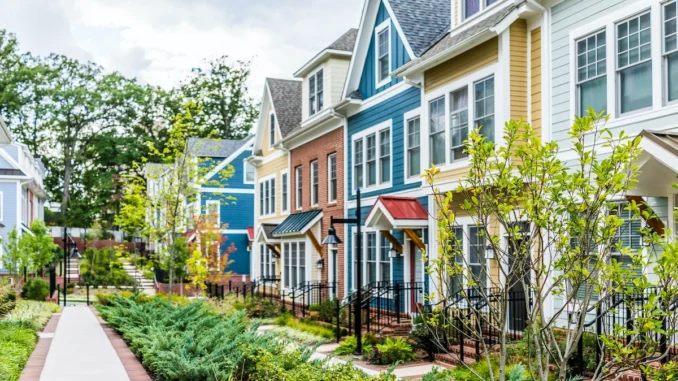
Despite affordability challenges, the Hispanic homeownership rate reached 48.6% in 2022, the eighth consecutive year of growth.
Latinos added a net total of 349,000 homeowner households last year, which is one of the largest single year gains over the last decade, the National Association of Hispanic Real Estate Professionals (NAHREP) said in its 2022 state of Hispanic homeownership report on Tuesday.
Since 2014, when homeownership rates among Latinos began increasing following the Great Recession, 2.3 million net new Hispanic homeowner households had been added to the market, accounting for 24.4% of overall homeownership growth. Today, there are 9.2 million Hispanic homeowner households.
Latinos made up for 38.7% of all household formations last year. This is in contrast to the previous two years when an unexpected boom in non-Hispanic White household formations nearly doubled that of Latino households.
The shift in recent trends was expected, the report notes, as the relative youth and growing population of the Latino community would add to new household formations.
Latinos trend younger as homeowners. About 70.6% Latinos who purchased a home with a mortgage in 2021 were under the age of 45, compared to 63.9% of the general population, and 61.5% of non-Hispanic White buyers, according to data from the Home Mortgage Disclosure Act (HMDA).
About 33% of Latinos aged 45 and under have the credit characteristics to qualify for a mortgage. Among those who don’t already have a mortgage, the share of mortgage-ready Latinos increases to 39%, according to Freddie Mac.
Latinos have the largest near mortgage-ready population of any racial or ethnic group, the report noted.
Latinos tend to be concentrated in larger cities and coastal markets where home prices are high, the report said. The rapid rise in interest rates had a cooling effect on the overheated housing market, which in turn created new barriers to affordability. The rise in interest rates dramatically increased monthly mortgage payments, even in markets that experienced price reductions.
NAHREP noted ample opportunity markets in states such as Texas and midwestern markets that traditionally haven’t had large Latino populations.
Texas has consistently topped the list for most Latino net migration, best opportunity markets and producing the greatest number of new Latino homeowners. Between 2020 and 2022, Texas saw a net gain of nearly 150,000 Latino residents. McAllen, Brownsville, and El Paso, Texas also made up the top three opportunity markets for Latinos, based on the number of mortgage-ready Latinos and affordability.
“Despite market challenges, the future of homeownership growth will continue to rely on Latinos, given that they are young, growing in population, and rapidly forming new households,” according to NAHREP.
The increase in Special Purpose Credit Programs (SPCPs) could play a promising role in closing the non-Hispanic White and Latino homeownership gap, NAHREP said. SPCP mortgage types include refinance, purchase, construction, home equity lines of credit (HELOC) and down payment or closing cost assistance.
In 2023, both Fannie Mae and Freddie Mac will run scaled multi-metropolitan statistical area (MSA) pilot SPCPs with selected lenders in various cities and metro areas.
Numerous lenders are expected to bring their own SPCPs to market this year, opening the door for new programs that could address common underwriting issues, such as debt-to-income ratios and non-W2 incomes, two factors that disproportionately impact the Latino community, according to the report.
NAHREP conducted its annual Latino Buyers Survey from January 1 to February 13, 2023, to gauge Latino home buying trends across the country.
The survey was administered online and received 510 responses. NAHREP conducted in-depth interviews with all 25 top Latino real estate practitioners.
